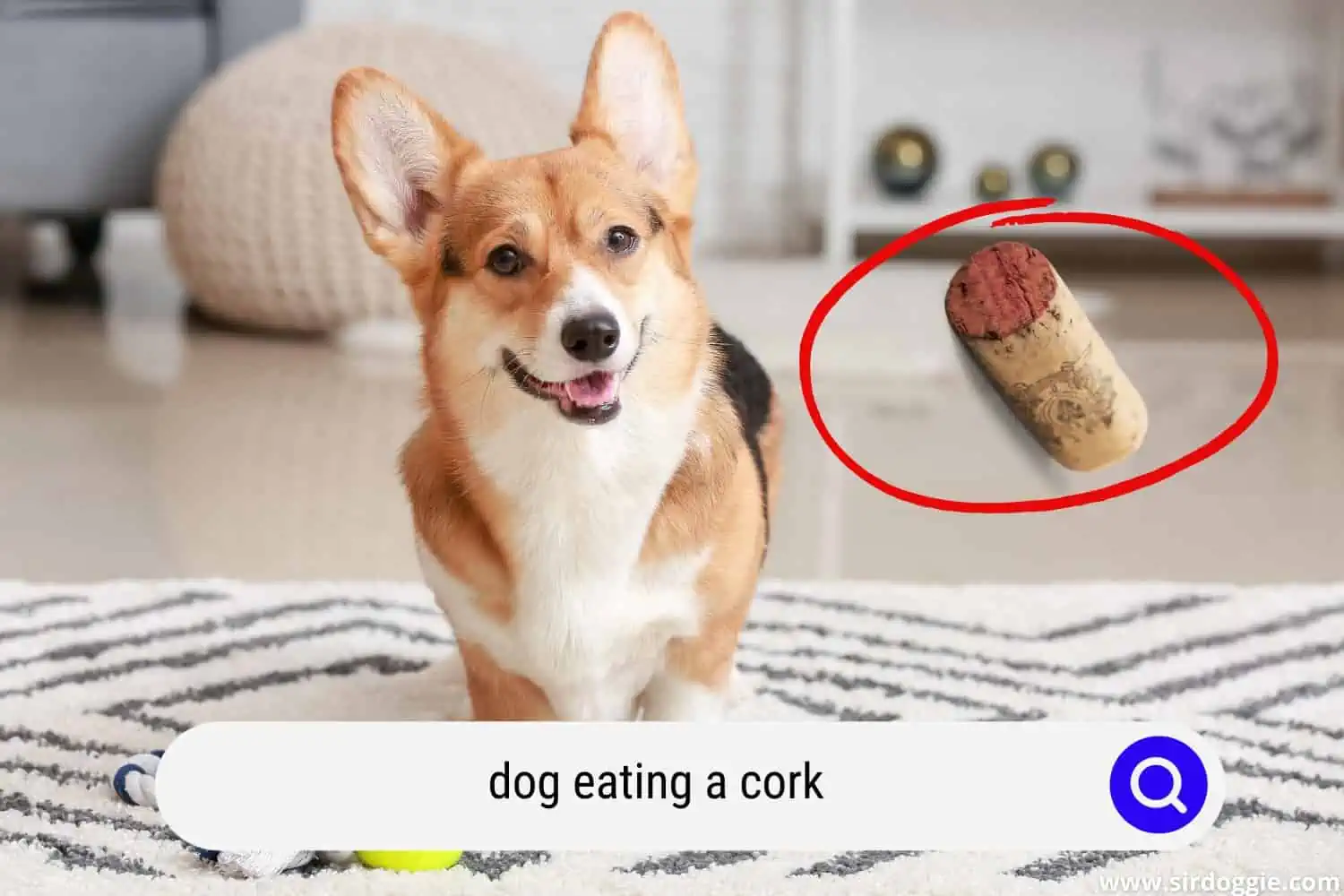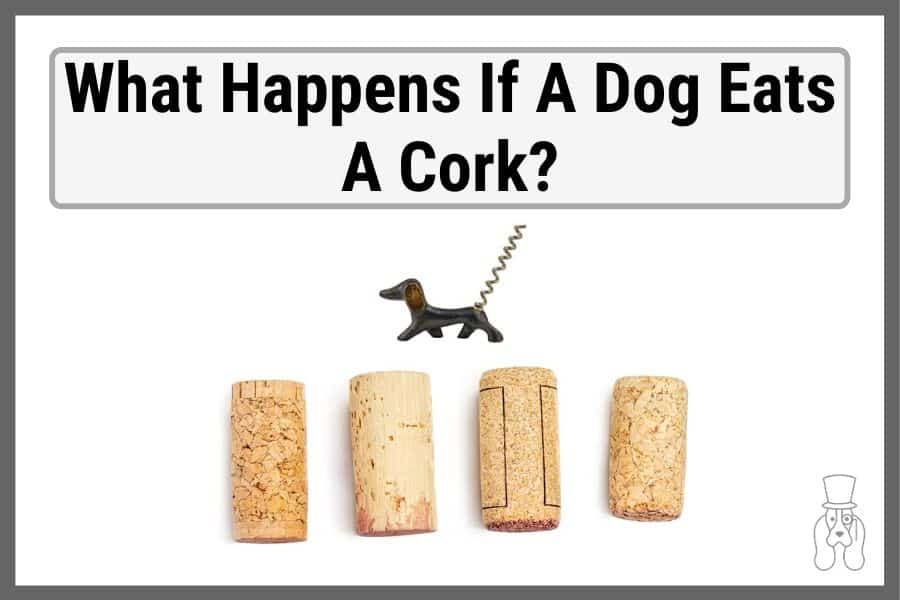What Happens If A Dog Eats A Cork?
What happens if a dog eats a cork? Cork itself is not digestible, so in most cases, your dog will either pass it through stool or vomit it up. That said, corks can cause intestinal blockages if your dog swallows them whole.

Having a dog is a lot like having a baby; you have to protect them from eating things that are dangerous for them.
Even the most attentive parent will have moments where things slip past their attention and vision. Plenty of pet parents, for example, have watched their dogs eat a cork and panicked.
It all depends on the situation.
Seeing a doggie eat a cork isn’t something any pet parent wants to see, but in most cases, it’s easy to handle. And dogs get into and eat all sorts of things from cigarettes to rocks to vinegar chips.
Here’s what every pet parent should know about dogs eating corks.
What Happens If A Dog Eats A Cork?
Cork is not something that dogs can digest. Assuming that your doggie chewed it up before they ate it, there’s a decent chance that they will pass the bits as they work through their digestive system.
However, there are still risks involved with corks that can be potentially lethal if they remain unchecked. In order to ensure your dog’s safety, careful monitoring, and veterinary attention are a must.
It’s always best to act sooner rather than later to address any concerns you have with your doggie.
Can Corks Expand In A Dog’s Stomach?
Cork is designed to absorb liquids and block out leakages. Assuming that you have a real cork, there’s a chance that it could expand in the dog’s intestinal tract. Not all corks have that expansion ability.
If you aren’t sure whether or not the cork your dog swallowed could expand, get a similar bottle, uncork it, and drop the cork in water. If the cork expands, the risk of your dog having a blockage is higher.
Could My Dog Just Puke It Up?
Dogs that have sensitive stomachs might be lucky and throw up the bits of cork they swallowed. If your dog recently ate the cork and is not at risk of vomit-related issues, you might be able to get them to cough or throw it up. Here’s how:
- Before you do anything, please be 100% certain that your dog ate the cork. You shouldn’t induce vomiting in a dog unless it’s to potentially prevent intestinal blockage.
- Grab some hydrogen peroxide. The stuff you already have in your medicine cabinet will do well. A recommended dose is 0.5ml to 1ml of 3% hydrogen peroxide per pound of dog weight.
- Weigh your dog. It’s important to know how much your dog weighs. When in doubt, assume they are lighter.
- Calculate how much hydrogen peroxide they need. Vets suggest giving your dog 0.5ml to 1ml per pound. It’s best to start with the smaller dosage option if you’re concerned about your dog’s ability to stomach it.
- Measure it out. One tablespoon is equal to 15 millilitres, while a teaspoon is worth 5 millilitres. Do the math and measure out a proper dose.
- Give your dog the dosage and rub their tummy. You might want to take them out for a walk while the hydrogen peroxide works through their system.
- Expect your dog to throw up within 20 to 30 minutes. Your dog will throw up the cork in a matter of time. If they don’t throw up and you only gave them the .5ml dose level, you can give them slightly more as long as it doesn’t exceed the 1ml per pound rule.
IMPORTANCE: vomitting means a loss of electrolytes and dehydration. Monitor your dog after induced vomitting to ensure proper hydration.

What’s The Worst That Can Happen?
If a cork causes an intestinal blockage, it’s possible that your dog will develop some pretty serious symptoms. Without being able to pass stool, your dog will have a limited time to survive.
If you believe a blockage could have happened, you need to take your dog to a vet immediately. Your vet may run a diagnostic procedure to help confirm the intestinal obstruction.
Treatments for serious intestinal or bowel obstruction in dogs include:
- Hospitalization to correct dehydration with fluid therapy
- Removal of obstruction by way of surgery or endoscope
- Resection and anastomosis depending on the damage done
- Gastropexy to untwist affected organs
- Antibiotics following surgery to prevent infection
- Medications for vomiting or other upset stomach-related issues
- Special veterinarian-recommended diet
How To Handle a Dog That Ate a Cork
Before you spiral into panic take a deep breath. Consider how many dog parents are out there and how many corks fall on the floor. This situation has happened before and solutions exist. There are ways to handle this. Here’s what most vets would suggest:
- First, ask yourself if your dog swallowed the cork. Did you see a portion of the cork lying on the floor? Did the cork just go missing? If you didn’t witness your dog eat the cork, there’s a chance they might not have eaten it. Double-check before you make an assumption.
- Try to figure out if your dog swallowed it whole or if they chewed it into pieces. If your dog swallowed it whole and didn’t choke, you still may need to go to a vet in order to get the cork removed. It’s always best practice to consult a veterinarian.
- Feed your dog smaller meals for the next couple of days. This is something vets call “supportive care.” Feeding them smaller meals with more fibre will help your dog pass cork bits with less strain on their system.
- Watch when they go to the bathroom. Dogs that have cork-related issues won’t have an easy time going to the bathroom. You might see them strain, poop less, or just look uncomfortable.
- Examine their stool for cork bits. Do you see evidence of cork in their stool? If you don’t see any signs of a cork being passed through the stool, your dog might not have eaten the cork. There’s also a small chance that they might’ve thrown up the cork already.
- If you notice signs of distress in your dog, take them to a vet. Any sign of blockage should be reason enough to call a vet and book an appointment. Even if they did eat the cork in tinier bites, it could still pose a risk.
When Should You Call A Vet?
In most cases, dogs will be able to pass (or cough up) a cork without requiring any sort of professional attention. Not all cases are worry-free. If you notice any of these issues, take your dog to a vet immediately:
- Your dog’s bowel movements have changed. If your dog is pooping far less, straining, or is unable to go to the bathroom, this is evidence of a blockage. Your vet will be able to help your dog flush it out.
- Your dog won’t eat. A sudden decrease in appetite should always be checked out by a veterinarian, even if they didn’t eat a cork.
- Your dog won’t stop vomiting. Dogs may get stomach irritation as a result of what was on the corks. If your dog won’t stop vomiting or is dry heaving, an ER visit may be required.
- Since your dog ate the cork, they’ve started to act listless and strained. A dog that is sick from substances that were absorbed by the cork will behave differently. They will be low energy, whiny, and stressed.
How Your Dog’s Size Can Influence the Outcome
Larger dogs have larger intestinal tracts, which means there’s more room for the cork to pass through. Smaller dogs, on the other hand, have tiny digestive tracts that can pose a higher risk of blockages if they swallowed a larger cork piece.
Smaller dogs are certainly at a higher risk. Even smaller pieces can cause a blockage in their tiny tracts. Moreover, smaller dogs may not be able to handle whatever substances (wine) that could be on the cork and will experience an adverse reaction.
Dog breeds that have known digestive tract issues are at a particularly high risk of complications. If your dog has special health concerns regarding his digestive tract or his size, your best bet is to call the vet as soon as you suspect that your dog ate a cork.

Final Thoughts
Pet parents have reason to be concerned when their dogs eat foreign objects or unsuitable foods. Often, the situation will resolve itself and the dog will be fine. However, there are exceptions and certain foods or objects are more concerning than others.
Cork itself is not digestible, so in most cases, your dog will either pass it through stool or vomit it up. Smaller dogs are certainly at an increased risk. Corks can cause intestinal blockages if your dog swallows them whole.
So, like with many things dog-related, it all depends on the situation. The best practice, as always, is to consult a veterinarian.

Family Dog Expert Author
Hi there! I’m Stuart, a devoted dog lover and family dog expert with over a decade of experience working with our furry companions. My passion for dogs drives me to share my knowledge and expertise, helping families build strong, loving bonds with their four-legged friends. When I’m not writing for SirDoggie, you’ll find me hiking, playing with my beautiful dog, or studying music.